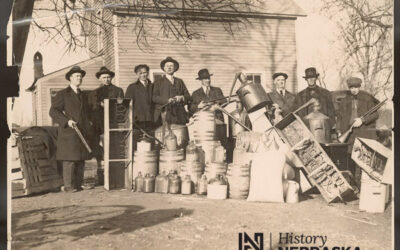Lincoln and Omaha currently prohibit smoking in most public establishments and eating places, and in April 2005 a statewide tobacco ban similar to the Lincoln city ordinance fell only two votes short of passage in the Legislature. However, current anti-smoking sentiments are hardly new in Nebraska. Michael Kuzma’s “Kicking the Habit: Nebraska’s 1905 Anti-Cigarette Law,” in the Summer/Fall 2005 issue of Nebraska History, explains the background of an earlier legislative effort to improve Nebraskans’ health and morals by curbing cigarette smoking.
In the late nineteenth century the invention of the cigarette-rolling machine made mass-produced cigarettes inexpensive and widely available for the first time. But parallel to the birth and wide adoption of the modern cigarette, the late nineteenth century also saw reform movements sweep the nation. The Nebraska Legislature in 1905 outlawed the sale, manufacture, or distribution of cigarettes and cigarette papers, hoping thereby to eliminate cigarette smoking. Although perhaps noble in its intentions, the law was ultimately unsuccessful because it did not prohibit or in any way control smoking. It only restricted cigarette sale, manufacture, and distribution. Resourceful smokers perpetuated their old habit by pioneering some ingenious methods of securing cigarettes.
Much like the current anti-smoking experiments in Lincoln and Omaha, passage of the law was motivated by what supporters considered the public’s best interests. Even in 1905 people knew smoking was bad for health. However, legislators also wanted to improve morals by penalizing the newly inexpensive form of tobacco used by the working classes. No restrictions were placed on the more socially acceptable pipe tobacco or cigars.
It did not take long for cigarette smokers to challenge the new law in court – with mixed results. The act was finally repealed in 1919, presumably because it was considered ineffective. The repealed legislation was replaced by two new cigarette laws, “Smoking cigarettes in public eating places, penalty” and “Advertising cigarettes, penalty.”
Echoing the reformist tenor of the times, Nebraska’s 1905 attempt to stamp out cigarette smoking was enacted to improve the health and morals of the state. Yet it levied penalties not against smokers in general, but only against users of the inexpensive form of tobacco used by the working classes. One hundred years later, the anti-smoking regulations in Lincoln and Omaha appear to be more effective in achieving their goals, the prohibition of all smoking in most public establishments and eating places.
(January 2006)



